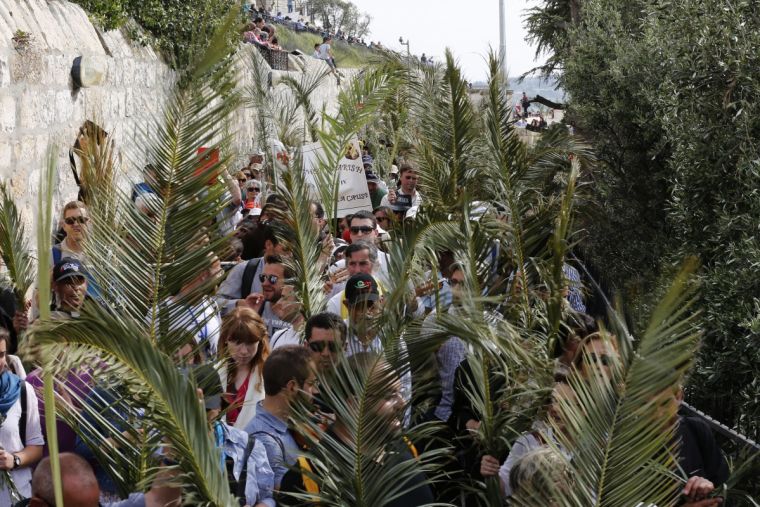
Christ Church Cathedral, Grafton
Palm Sunday
28 March 2021
[ video ]
As we celebrate Palm Sunday today, our Jewish friends are observing Passover.
To our Jewish neighbours here in Grafton, to our Jewish citizens around the nation, and to all Jews everywhere—whether in Palestine or in the Diaspora—we say Chag Pesach sameach (happy Passover festival) and we wish them ziessen Pesach, a sweet Passover.
Passover and Holy Week are for ever entwined, even if some years our different calendars mean that we observe them a few weeks apart.
For many centuries, Jews have ended the Passover seder with these words:
L’Shana Haba’ah B’Yerushalayim
לשנה הבאה בירושלים
Next year in Jerusalem
Jerusalem draws people of faith—not just Jews, but also Christians and Muslims.
We want to be there.
For sure I do, just as soon we are allowed to fly once more!
That was also true in ancient times.
At Passover time the population of the city would swell from 20,000 (some say up to 100,000) to 2,000,000 people.
Any Jew who could be there would be there.
And so would the Roman army!
The stage was also set for conflict.
The Roman procurator, Pontius Pilate, came to Jerusalem for the Passover, but not for religious reasons. He was there to keep an eye on the crowd and ensure direct control of his bolstered garrison during the week-long festival of liberation from enslavement.
This week, together with our Jewish friends, we celebrate the crazy idea that the compassionate power at the very heart of the universe is on the side of the powerless, and opposed to every form of empire.
This week drips with intense religious meaning, but also with powerful politics.
Every empire, no matter its religion, is held to account by the sacred truths we affirm this week.
We have a choice in the way we understand our religion, whatever our faith happens to be.
We can choose to see God as endorsing the emperor, or the ways our society arranges power, wealth and opportunity. That has always worked well for religion as we get a cut of the action: tax-free lands, freedom from military service, governments funds for church buildings and programs. Sometimes even a seat in the House of Lords.
That kind of god rides into Jerusalem on a white horse surrounded by the banners of imperial privilege and with the power to arrest, imprison and kill their opponents.
There is a different kind of god who rides into Jerusalem on a donkey.
Such a god enjoys no imperial privileges and commands no army. His kingdom is not of this world. Or more correctly, his kingdom in this world reflects the way that the divine will is enacted in heaven. Far from getting access to government funds or a place at the table when big decisions are being made, this donkey-riding-god is murdered by the people who enjoy imperial privileges.
The god who rides a white horse thinks he has defeated the god who rides a donkey.
But it is not so.
The slaves are set free, the crucified one is raised to life and exalted to glory.
That disruptive truth is central to the Passover story as well as to Holy Week.
Today I invite you to pause and think about which kind of god you imagine yourself to be serving.
Does your god ride a horse or a donkey?

Thank you Gregory for a new slant on the Easter Story. Your blog really points out the difference between who Jesus was (the Messiah) and the one the Jews were expecting – a King to rid them of the Romans. Those so-called learned Scribes & Priests didn’t know their scriptures. psalm 22 for example.
Dear Noela: I appreciate your positive comments, but I suspect you may have misunderstood my point. I was in no sense at all critiquing any of the multiple Jewish messianic hopes around the time of Jesus. To be clear, there was not ever a single “Jewish messianic expectation” and that remains true even today. Both Passover and Palm Sunday/Easter proclaim the same truth that God opposes empire, irrespective of religion and ethnicity. In place of “empire” please insert “the current western economic and political systems from which most Western people benefit personally.” Psalm 22 has nothing to do with Jesus except in the imagination of the Gospel writers as they shaped their various stories (narratives) of the death of Jesus, beginning with Mark and then followed in turn by Matthew, John and Luke. I suspect you will not agree with my point of view (which is fine), and for sure you will find some conservative Religion scholars to back up your point of view, but I did not want you to be left publicly endorsing my more radical ideas about the meaning of Jesus’ ministry and especially his death. Please feel feel to retract your comments or otherwise dissociate yourself from my ideas. God’s grace is large enough for us both to find a spot to stand gently with our opinions. Grace and peace.